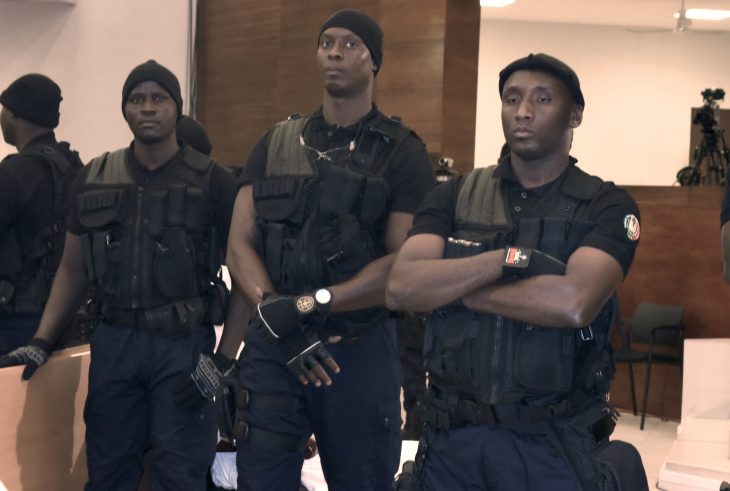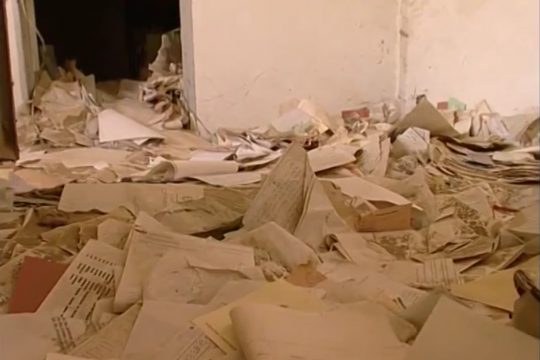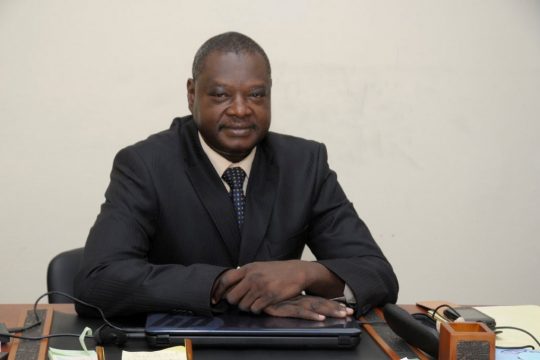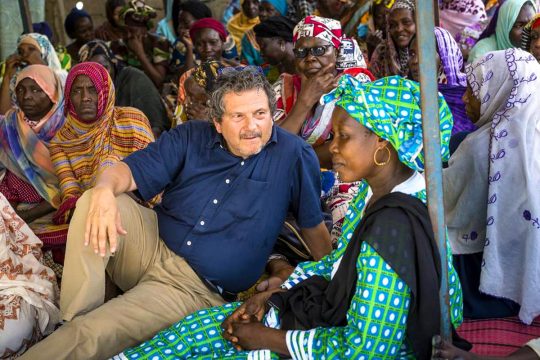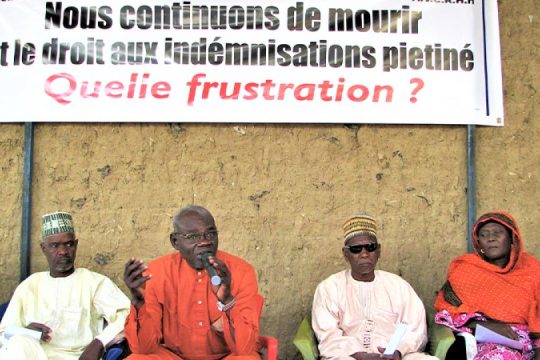After an eventful first day, the Extraordinary African Chambers trying Hissène Habré in Dakar ordered late Monday afternoon that the former Chadian president be brought to court on Tuesday morning by “public security forces”. His lawyers denounced a “militarization” of the proceedings.
Hissène Habré, in exile in Senegal since his ouster in 1990 and detained since July 2013 in a Dakar prison, is charged with crimes against humanity, genocide and torture perpetrated under his regime.
The former president is on trial before the Extraordinary African Chambers (EAC), a special court set up within the Senegalese justice system under an agreement between Dakar and the African Union (AU). It has a mandate to try serious violations of international humanitarian law committed in Chad from 1982 to 1990.
On Monday morning, before the prosecutor and judges entered the courtroom, Hissène Habré made an appearance that was brief but certainly did not go unnoticed. He had been brought by the prison authorities. The old orator, sporting a turban, seized the moment to get his voice heard. “Down with imperialism! Long live Chad!” he cried. This chant was immediately taken up by young supporters present at court, leading security forces to remove the accused to another part of the courtroom complex.
Once calm had been re-established, the prosecution team led by Chief Prosecutor Mbacké Fall entered the courtroom followed by the judges, headed by Gberdao Gustave Kam of Burkina Faso.
The Prosecutor spoke first of the victims’ 20-year struggle, then stressed that this trial “is not a relentless pursuit against the person of the Accused”. Mbacké Fall claimed his case was based on “in-depth investigations”, and promised to prove beyond reasonable doubt the existence of “both civil and military chains of command” linking the former president to the crimes of which he is accused.
“I invite him to appear to answer to History for these serious crimes of which he is accused,” said the Prosecutor.
Presiding Judge Kam then gave the floor to Chadian lawyer Jacqueline Moudeina, made famous over the past years by her long struggle in support of the victims. She accused Hissène Habré of having been, for more than a decade, “the executioner of his people, the orchestrator (of crimes committed by his services), giver of orders, instigator”. But she also said the lawyers representing victims would be guided “only by the force of the law”.
“Your decision will be appreciated by your colleagues”
It had been planned that the Defence speak after the victims, but none of Habré’s lawyers were present in court.
Chairman of the Senegalese Bar Mbaye Guèye, who spoke next, said the chosen path of the Defence should not in any way impede the Accused’s right to the presumption of innocence. “Yes to the fight against impunity,” he said, but also reminded the Chamber of its obligation to guarantee a “fair trial”, whatever the chosen strategy of the Accused. “Your decision will be appreciated by your fellow judges, by lawyers, by universities, by your descendants,” he continued, urging the three judges to “render good justice, although we know that perfection is not of this world”.
In an interview with the press after the inaugural ceremony, another Senegalese lawyer, Ousmane Seye, went further, saying that there was “a taste of the unfinished”. “The African Union has not given the African Chambers a mandate to judge Hissène Habré, it gave them a mandate to judge the facts, the crimes committed in Chad from 1982 to 1990. But these events implicate many people, some of whom are following this trial sitting comfortably in their armchairs in Chad,” said the lawyer, mentioning by name the current Chadian president Idriss Deby. When asked about the trial continuing in the absence of the Accused, Seye replied that that “is his absolute right. Justice is not violence”.
After the morning break, the Chamber was informed that Habré was still refusing to attend the proceedings. Judge Kam then sent him a summons to appear at the afternoon hearing. But the former president had not changed his mind, leading the presiding judge to order that he be brought “by public security forces” to appear at Tuesday’s hearing.
Speaking to JusticeInfo.Net in the court press room in Dakar, François Serres, one of Habré’s lawyers, denounced what he called “a pathetic decision, a militarized decision”. “President Habré is being consistent. He cannot appear before judges who have already decided to convict him,” said the French lawyer, denouncing what he called “a real judicial farce”.




